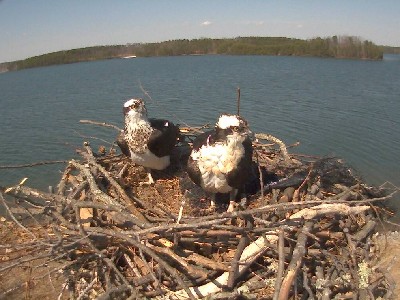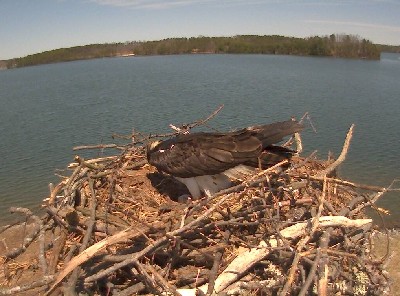OSPREY WATCH 2


The eggs are arriving! The first egg appeared on March 31. The second egg was laid on April 2nd. A third egg is anticipated and possibly a fourth. The osprey nest is located atop a pole and platform near the R-16 channel marker, behind the Discovery Center at Smith Mountain Lake State Park. From the time the male osprey arrived on March 12th, a week later than the female, until the first egg appeared was 19 days. This is a short time for the ospreys to produce an egg which could range from 10 to 39 days. This indicates the ospreys are probably an older experienced pair. They arrived and immediately claimed their old nest site. The female was quick to pick her suitor based on his good track record of providing food for the brood in the past. What is interesting about the osprey pairing process is that well-fed females are less likely to beg for food as is customary, or copulate with other males. This indicates that the courtship feeding ritual may be one way that ospreys guarantee long-lasting mate relationships. The male not only feeds his chosen mate, which keeps her close to the nest, but he also defends her and the nest site from other males.
The eggs on the nest are about the size of chicken eggs but are not white. They have a mottled appearance which acts as a camouflage so they are not easily seen by other raptors. The eggs are incubated for about 30 days before they hatch. During this time the female osprey develops a brood patch, which is a temporary gap in the feathers on her belly. The skin is bare and has a lot of blood vessels on the surface to increase the heating ability to optimize the temperature to 100 degrees. The male osprey is the primary food provider but sometimes sits on the eggs. As the embryo nears 30 days in the egg, it begins to breathe from an air pocket inside the egg. It chirps to its mother who responds and encourages the chick to peck at the shell. It takes about a day for the chick to peck a hole big enough to exit.
by Jim Gerhart
Friends of Smith Mountain Lake State Park

